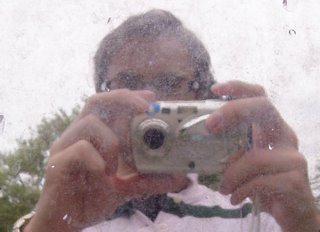Cinema This Weekend: A Nation's Fear on Display
This weekend, in between parties, tennis, and Shakespeare on the Saskatchewan, I managed to catch both the big films that came out: M. Night Shyamalan's The Village, and Jonathan Demme's re-imagining of the political-thriller classic, The Manchurian Candidate. One wouldn't think that they don't have much in common. Shyamalan's film is very much in the same vein as his last three movies (few people know that he also directed two films prior to The Sixth Sense, Praying With Anger (1992) and Wide Awake (1998) neither of which I've seen). A 19th Century farming community is surrounded by a woods filled with creatures which keeps them isolated from the the rest of the world. It relies on wonderful cinematography and clever suspense to keep the audience tense. The Manchurian Candidate is a political thriller, based on the 1962 classic with Frank Sinatra, that is suspenseful, entertaining and remarkably relevant to the present times we live in.


One wouldn't think that a 19th Century village would have anything to do with a plot to assassinate a presidential candidate, but the truth is that both films are exploring something that is very similar:
A nation's fears and how they deal with them.
In The Village we learn that the creatures (again I warn
The allegorical meaning of this is obvious. It could stand for religious orders whose stories keep their adherrants fearful, but safe from the corrupting influence of "the world." The lesson for Christianity is clear, in a time when so many in the faith have attempted to form "ghettos" where their youth will be safe, but at what cost? Or, the village could be America, kept safe from the terrorism and violence of the outside world, but with "Amber Alert" systems, media hysteria, and the abolishment of civil liberties. Like the elders in Shyamalan's village, the government keeps the truth from us, scaring us into believe there are terrors out there. But what the truth is, we can't be certain. The monsters in the woods are there to protect us from other more frightening realities.
The Manchurian Candidate likewise is interested in a nation that is in the grip of fear. A presidential election while the nation is embroiled in the war on terror. Conspiracy is all around. Perhaps Manchurian Global belives that putting a sleeper agent in the White House will afford everyone safety. Perhaps it's better the monster you control than the one you don't.
There's a speech during the first half hour of the film, by the Senator Eleanor Shaw, could have come straight out of the national convention of either political party. Her assertation that America is under attack and that her son is the answer to its salvation sounds similar to assertations I've heard from both Republicans and Democrats.
And that's what American's are feeling right now. Like Michael Moore's Fahrenheit 9/11, Demme's Candidate is about an American that doesn't know exactly what is wrong, but is scared none-the-less. Both The Village and The Manchurian Candidate are films about societies in the grip of fear for their own protection. But what is most frightening is that in the end neither one has found a better solution.


0 Comments:
Post a Comment
<< Home